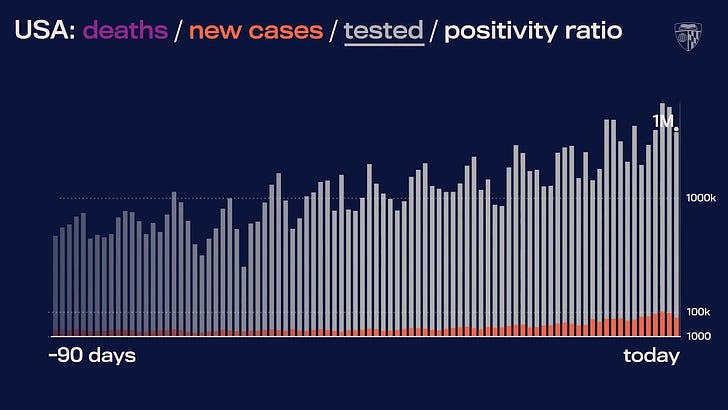Good news on vaccine won't blunt current disaster
Moderna's preliminary data excites scientists, but new cases and deaths in next several weeks put impossible strain on healthcare system and others.
Note to my readers: An early edition of this Monday memo was sent to paid subscribers only. Please consider supporting this publication with a paid subscription. Or you can buy me a cup of coffee, if you like. Thank you!
The vaccine news is great, but it’s not here yet.
What is here now: uncontrolled COVID-19 throughout the USA
Hyperbolic words like “catastrophe,” “devastating” or “astonishing” don’t quite capture how many public health professionals react as they look at the latest news on COVID-19 in the USA.
But we also are buoyed by the very encouraging news of preliminary data on Moderna’s COVID-19 vaccine, showing that it thwarted infection in 95% of subjects in the clinical trial. Although this has not yet been peer-reviewed, this information - plus similarly strong preliminary data last week from Pfizer — bolsters optimism that an effective COVID-19 vaccine will be available for distribution early in 2021. Both of these vaccines were created using entirely new technology, and it is proving to be not only promising but truly exciting.
Because having a vaccine is not the same as actually getting people immunized, leaders must push harder than ever on the importance of “non-pharmaceutical interventions:” Wear a mask, Wash your hands, Watch your distance. There are no other known, proven ways to prevent COVID-19.
The latest data compiled by Johns Hopkins indicates that the surge now is hitting Illinois, Wisconsin, and California hard, in addition to the continued pressure on health systems in the Plains states and throughout the Midwest. COVID-19 is spreading uncontrolled now in all 50 states.
Here's a 60-second video from Johns Hopkins with an overview of the latest US data. (The JHU COVID-19 team publishes a video like this every day.)
And a few other notes that I’ve pulled from several different data sources:
Deaths from C19 surged more than 35% in the past two weeks.
About 70,000 people are currently hospitalized due to COVID-19, up more than 40% in two weeks.
The average number of daily new cases has more than doubled in a month, from around 47,000 to 97,000 as of Saturday if you look at the monthly rolling average.
It's worse if you look at a smaller timeframe: average new cases now over 150,000 - up more than 80% in two weeks.

The number of new COVID-19 cases since the pandemic began has steadily increased. The USA has never “flattened the curve” or stopped the spread, despite good results in places like New York and parts of California. Chart is from STATNews.
Thousands more empty chairs at family dinners
As of today, nearly 247,000 people have died from confirmed COVID-19 in the USA, but these numbers don’t reflect the emotions, the exhaustion, the emergency that so many healthcare professionals, business owners, families and individuals are facing. We are getting numb to the numbers, but we cannot lose sight of the people those numbers represent. For every person who dies, think of the family and friends they left behind and the healthcare workers who did what they could to help them. The strain has prompted some nurses and physicians to quit.
One more detail that brings the scale of tragedy into clearer view: Two weeks ago, El Paso, Texas, accepted four of 10 refrigerated temporary morgue trucks it requested. The other six were in place last week… and local officials now say they’ll need more, especially as hospitals are limiting life-saving treatment in some cases.
Depending on the configuration, the mobile morgue trucks typically hold 60 or 90 bodies. One company that builds morgue trucks sold “nearly 50” during the first six months of the pandemic.
Check out this German public service announcement to promote COVID-19 precautions. It’s a smart approach. Would it work in the USA?
A couple of worthy events
The outstanding journalism team at STATNews is hosting a three-day online conference today through Wednesday that includes many of the top names in the fight against COVID-19, including leaders from the companies developing COVID-19 vaccines and treatments. If you need to know what’s happening with COVID-19 at the highest levels of science, government and the private sector, it’s worth the $300 price tag, in my opinion. (I do not get anything for referring my readers to this event, and I paid for my own ticket at the same price as everyone else.)
Experts at Johns Hopkins are doing a webinar Thursday on how the United States can reverse the current COVID-19 trends. Details at this link.





